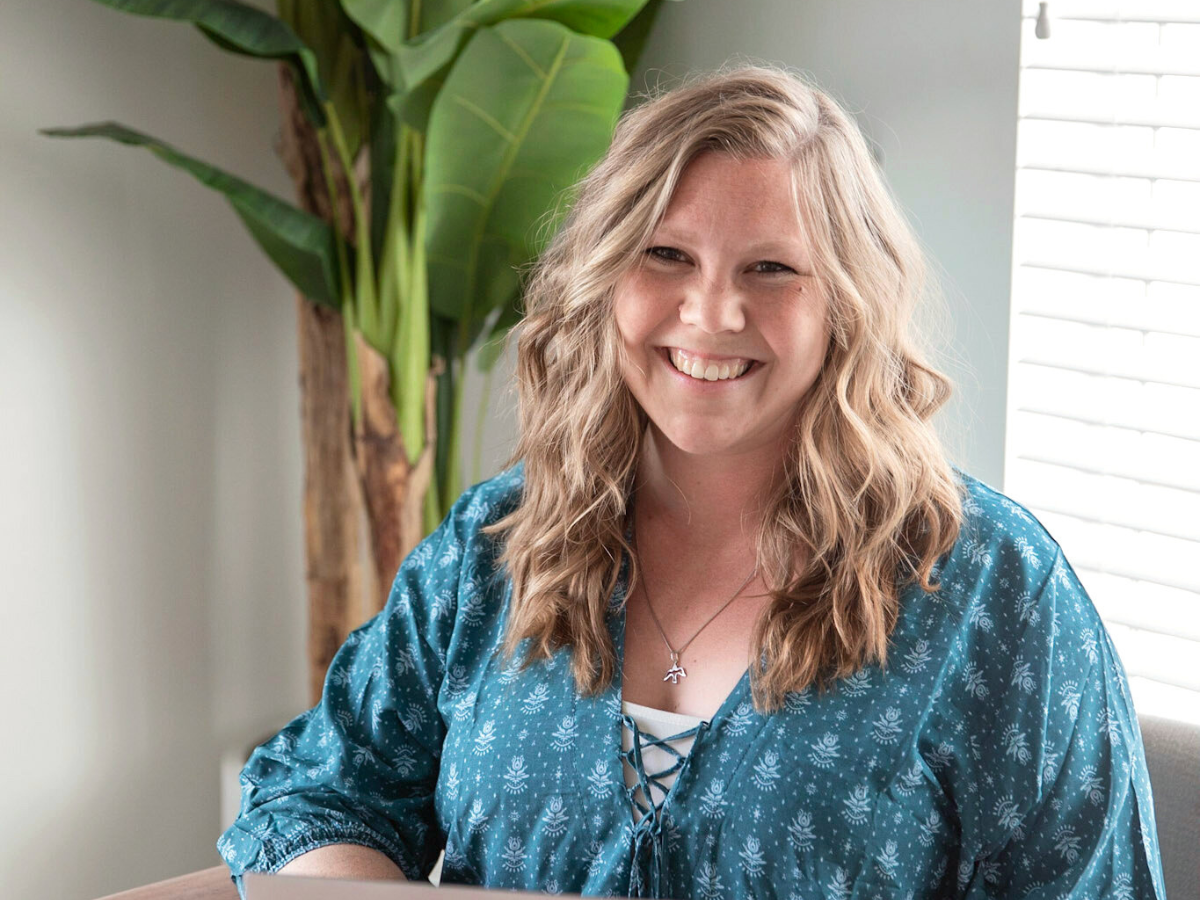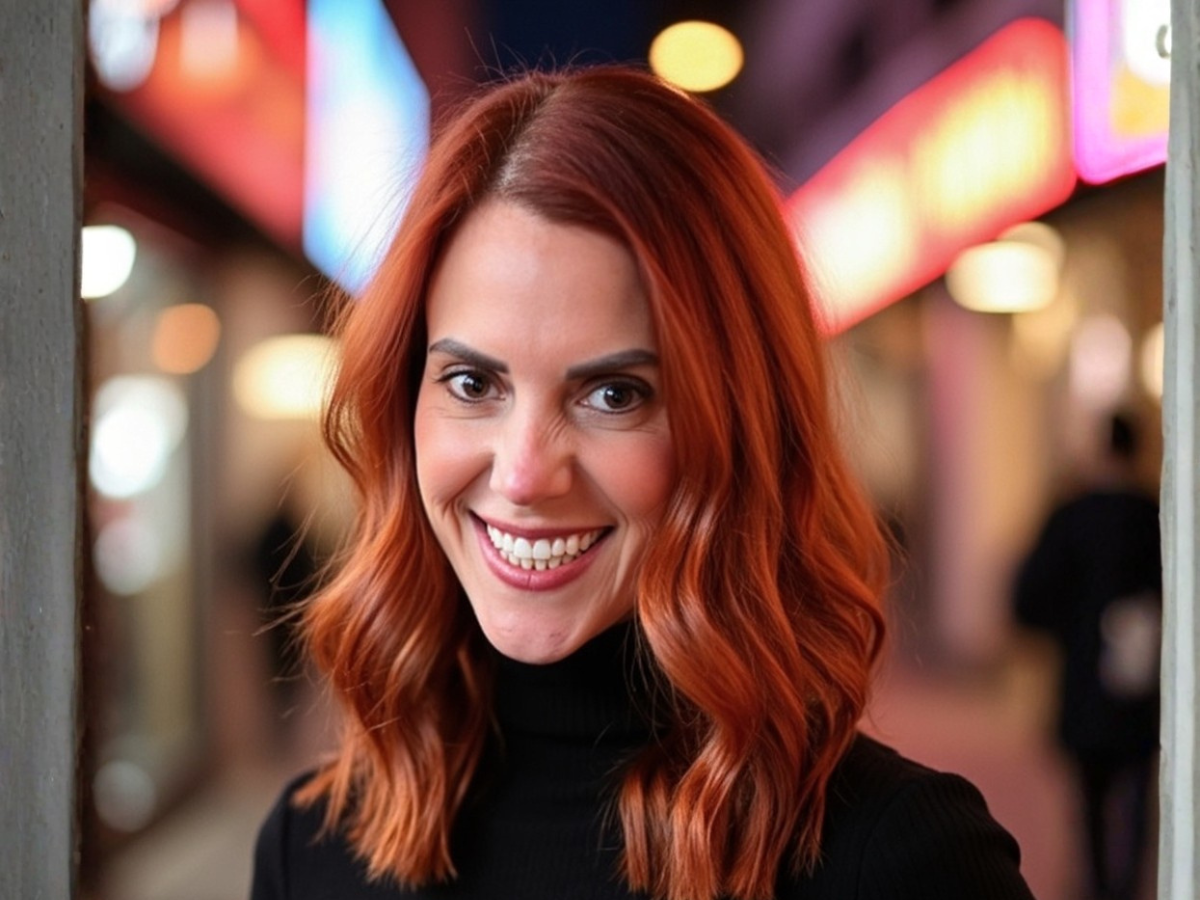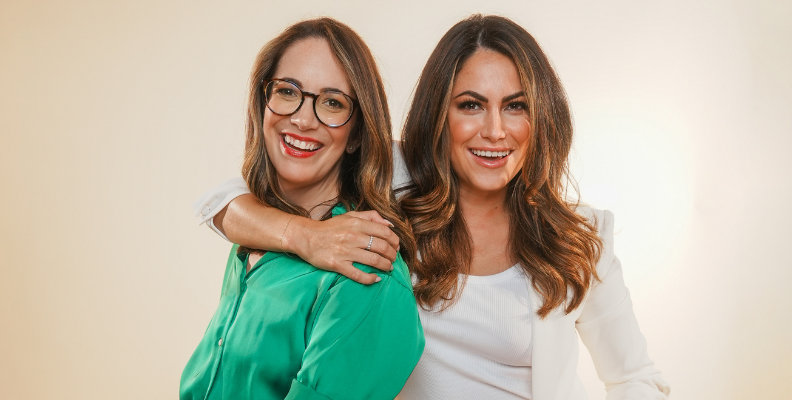
In Conversation with Andrea Ippolito of SimpliFed
Founder of SimpliFed
October 21, 2020
Describe your business in a few words?
SimpliFed is a virtual lactation and infant feeding support platform providing answers through a secure, online, video-based connection from international board certified lactation consultants.
What made you take the leap to start your own business?
Two years ago, my daughter Mae was born early and underweight, and she continued to lose weight because I was not producing enough breast milk. I leaned heavily on lactation consultants to help support me through this experience. I was lucky: they were incredible coaches, not judgemental, and helped me continue to breastfeed while also supplementing with formula. As a new mom, this meant the world to me because I originally felt like I was failing my first, basic duty as a parent: to feed my child.
During COVID-19, I learned that more new parents were struggling to access that same support and resources that I depended upon when I had my daughter. Because of the pandemic and social distancing measures, new parents weren’t able to access that same level of in-person care that I received. I knew something had to be done to help them.
When I was a graduate student at MIT in 2010-2012, I studied telehealth in the military. With that experience in my pocket, it clicked: We could extend breastfeeding and infant nutrition support via telehealth to new parents. This was how SimpliFed’s online breastfeeding and nutrition support was born (no pun!). We launched to provide pregnant women and new parents better access to board-certified lactation consultants from the safety of their own homes.
What was your background prior to starting your own business?
I studied biomedical engineering at Cornell University because I have always been fascinated by the human body and improving healthcare systems. As a scientist at Boston Scientific, I looked at the impact of implanted medical devices on the surrounding cells inside the body. While I loved working there, I realized that healthcare was so much more than just a device - it was the clinicians, policies, incentives, and enabling technological infrastructure. To help broaden my system’s knowledge of healthcare, I pursued my Master of Science degree at MIT where I studied telehealth in the military while also engaging with the entrepreneurship ecosystem. I Co-Directed the MIT Hacking Medicine team, which organized hackathons, which cultivated diverse stakeholders including clinicians, designers, engineers, patients, and entrepreneurs to build innovative healthcare solutions. Companies like Pillpack and Smart Scheduling (a start-up that I co-founded that was later sold to athenahealth) were one of the products of our hackathons.
After pursuing MIT and our start-up, I was deeply honored to serve as a Presidential Innovation Fellow based out of the White House Office of Science and Technology Policy and General Services Administration. My appointment there was at the Department of Veterans Affairs (VA), the largest healthcare system in the country, which is also one of the earlier and largest adopters of telehealth. While I was there, I managed the VA Innovators Network to help stimulate new innovations to better support Veterans and their families. By the time I left, we had launched 150 innovation projects in 32 VA Medical Centers across the US.
Did you always know you wanted to be an entrepreneur?
I knew that I was interested in using entrepreneurial principles to tackle challenges in healthcare. I recently heard about research that shows that entrepreneurs aren’t necessarily risk-lovers, but they are risk managers and this definitely resonates with me. In healthcare, there is a tremendous amount of opportunity to better serve patients and this is particularly true with women’s health and baby health, which there is a complete lack of new approaches to better serve moms and babies. I can think of no better field to utilize entrepreneurial practices to design new ways to increase access to support to allow moms and babies to thrive and not feel so alone in the system.
Take us back to when you first launched your business, what was your marketing strategy to get the word out and did it go as planned?
It is definitely a work in progress. Our audience includes millennial moms who find out about new products in services via two main channels. The first is from trusted friends and family. As a new service, we couldn’t lean on this yet. The second is through instagram through ads and influencers. When we first got started, we called it the “summer of experiments” and tried out different strategies on instagram such as with ads, thought leadership, and influencers, along with SEO strategies. So far, instagram ads have been the best way to generate leads, but we are now thinking about how to spread the word to get more referrals from friends and family.
We always learn the most from our mistakes, share a time with us that you made a mistake or had a challenging time in business and what you learned from it?
My background is as an engineer and scientist, so digital marketing was a completely new, humbling experience for me. I had to spend a ton of time understanding the different aspects of digital marketing and I leaned hard on our partnership with SocialFly to make things happen. The mistake I made is not recognizing how critical it was for me to learn these digital marketing strategies earlier, so my advice for any entrepreneur is to partner with a co-founder whose skills complement yours and/or recruit people with these superpowers if you don’t have them on your team already.
What is the accomplishment you are the most proud of to date?
I have two answers to this question. I am incredibly proud of the wonderful international board certified lactation consultant experts that we have recruited to the team. They have dedicated their lives to supporting moms and babies and meeting parents where they are at in a non-judgemental way. Breastfeeding is hard. Making decisions about infant formula and breast pumps is overwhelming. Navigating anecdotes vs. evidence-based approaches is confusing. Whether during pregnancy or the first months of your baby’s life, our lactation consultants are here to answer your questions to provide answers quickly through a secure, video-based connection. I am beyond proud of the wonderful team that we have built to accomplish that mission.
My second proudest moment to date is our partnership with Milk Stork who has been changing the game on how to support working moms as they transition back to work. They have wonderful relationships with employers across the country and they are now working with their employer partners to provide SimpliFed services. We were thrilled to partner with them!
When hiring for your team, what is your go-to interview question? Please share any hiring tips you can share from your experience?
It depends on the interview. If I am interviewing IBCLCs, then I ask about their approach and why they serve moms and babies. In particular, based on feedback from moms, I also ask them their thoughts on breastfeeding and sleep. I have heard that some IBCLCs have told moms that you can’t do both (and is not true!), so I make sure to uncover this in an interview. Also I like to chat through their thoughts on infant formula and breastfeeding.
To date, newborn and infant nutrition is framed as “breastfeeding versus infant formula.” Basically: an either/or, with a bunch of stigmas attached to each option. But, according to the CDC, about 75 percent of babies use infant formula in some capacity by the time they are 6 months old. Indeed, breastfeeding has great benefits for babies and moms. For babies, access to breastmilk has been shown to protect against respiratory illnesses, ear infections, gastrointestinal diseases, eczema, and sudden infant death syndrome. For mothers, breastfeeding may help reduce postpartum blood loss and may lower risk of postpartum depression, Type 2 diabetes, rheumatoid arthritis, cardiovascular disease, breast cancer, and ovarian cancer.
But, the reality is that exclusive breastfeeding is not an option for many moms. And so, with SimpliFed, we sought to redesign the experience for new parents to arm them with information to help make the best decision for them whether that is breastfeeding, supplementing, donor milk, or formula feeding. While we would love for every mom to breastfeed, we know that is not a reality for all and we need to do a better job of meeting parents where they are.
How has your business or industry been impacted by the COVID-19 pandemic?
Sadly, the COVID-19 pandemic has fueled the need more for our business of providing tele-lactation and nutrition support for new parents. During the pandemic, I heard from countless parents that they were troubleshooting alone in and around the birth of their baby. Even before the pandemic, the reality is that each mom and baby had their own unique, challenging experience and the pandemic brought this to the forefront even more because parents across the US were having difficulty accessing support after having a new baby.
Also the pandemic has shown an ugly light on the need for more systematic change and policies supporting new parents. For those lucky enough to have it, paid parental leave is a huge reason for higher levels of breastfeeding, which has given many new parents the financial flexibility and the gift of time to focus on breastfeeding. Also of note, the children of educated, well-off mothers are more likely to breastfeed because they have access to paid parental leave, careers with access to breaks for breast pumping, and disposable income to hire support such as night nurses. However, according to a national survey of employers conducted by the Bureau of Labor Statistics (BLS), only 17% of private industry U.S. employees had access to paid family leave through their employers. Paid parental leave in the private sector is voluntary and more prevalent among managerial and professional occupations.To continue to improve these levels for all new parents, not just those lucky enough to have it through their employer, the true way to make systemic change is by implementing paid parental leave universally across the country (so make sure to call your Congresswomen and Congressmen!). In the meantime and even if it does get implemented (fingers crossed!), we need to think about the parent experience and how we can support them in the most convenient and effective way possible with online breastfeeding and infant nutrition support.
We created SimpliFed to help support parents in their baby’s breastfeeding and nutrition journey. SimpliFed offers three types of appointments with our board-certified lactation consultants: a free appointment for pregnant parents to learn more about their options, a 30-minute $50 appointment for quicker questions, and a longer 1-hour appointment for $150 with new parents with follow-up communications.
What's next for your business? What can we expect to see over the next few years?
We are highly focused on continuing to build a relationship with new parents to meet them where they are at. In the coming years, we are focused on delivering a more longitudinal experience starting during pregnancy to help parents reach their feeding goals - whatever those might be!
What is the biggest lesson you have learned in 2020?
The biggest lesson that I have learned in 2020 is the importance of taking care of you and your family first, then the business. Without your health and sanity,, then nothing else can work! As women and working parents, we can tend to forget that. Also more than ever, we need strong female leaders who can be role models for our children and tackle some of the systemic issues facing society. Ruth Bader Ginsburg tackled issues surrounding gender equality in a methodical, thoughtful way to change the game for millions across the country. One of my favorite quotes of hers is “Real change, enduring change happens one step at a time.” To better support moms and babies, we believe is SimpliFed is one, small step in that journey and we are part of countless others trying to tackle some of the previously under-supported issues surrounding maternal and baby health.
What do you know now that you wish you knew when you were first starting your business?
I would take time to learn from peers about some of the not-as-sexy, but critical, pieces of starting a business, such as financing, accounting, taxes, legal matters, and insurance. I am so much more confident now than when I started because I now understand each of these at a much deeper level. I would tend to shy away from topics that I was unfamiliar with, but you can only ignore these topics for so long. The problem is that if you ignore them for too long, they build up and become urgent matters to solve. At that point, you are firefighting and the issue will be way more expensive (both financially and mentally!) to get the issue resolved.
Also I find that I learn a tremendous amount from near peers who are one step ahead of me in the growth of their business. They are fresh on the challenges that they just surmounted and I learn a tremendous amount from them, so I highly encourage founders to do somewhat regular check-ins with a near peer to learn from them. It increases your velocity of learning.
How have you managed to stay grounded this year?
My daughter Mae is 2 and she has definitely kept me grounded. She doesn’t understand the pandemic, which is nice to be an alternate reality with her. As much as possible, we go on walks and short hikes with her to get outside. Also starting SimpliFed has been helpful in keeping me focused on serving moms and babies during these troubling times.
Do you believe in work/life balance? What are some of your best tips?
This is an area that I have not perfected and am actively figuring out. During COVID-19 especially, I find it extremely difficult to unplug and stay away from my computer or phone. When you are an entrepreneur, your business tends to overwhelm your life and thinking. It is important that you shift between your personal life and work life. Now for a more positive spin, the COVID-19 pandemic has allowed me to spend more time at home with my family and in a way, I have been able to be more efficient. Let me give you an example: I live in Ithaca, NY and I am raising my first funding round right now. If I were fundraising pre-COVID, I would be constantly criss-crossing the country meeting with investors. Now, investors are way more open to investing without having met in-person with pitch meetings over Zoom only. While there is a tremendous amount with this pandemic that has set back working parents, the ability to not have to travel is one area where we have been able to speak and collaborate with more people than ever before. This includes both investor pitches and other stakeholder meetings as well, such as partnerships.
I am hopeful that a lot of the workplace practices that have previously set back working parents as entrepreneurs, such as having to travel every week to meet with investors, customers, and other stakeholders, will now look differently after the pandemic.
What's something our audience would be surprised to learn about you?
I recently testified in Congress in January in the House of Representatives Small Business Committee on how to increase patent and commercialization rates for women and other underrepresented entrepreneurs. First, let’s start with the good news: according to the National Center for Education Statistics in 2019, women earn more than half of bachelor’s degrees (57.3%), master’s degrees (59.4%), and doctoral degrees (53.3%), and women are close to half (46.9%) of the total US labor force according to the Bureau of Labor Statistics in 2019. Sadly, women make up only 28 percent of the STEM workforce and men are majoring in STEM-related fields at much higher levels than women at the undergraduate level. However there’s a silver lining: research from McKinsey has shown that organizations with women in management outperform industry averages on several fronts, including profitability. Fortune 500 companies with at least 3 women in leading positions saw a 66 percent increase in ROI. Diversity within an organization or team, including gender diversity, is associated with improved productivity, creativity, and organizational sales and profits.
When I testified in Congress, I specifically focused on ways to increase the number of STEM women inventors and entrepreneurs, because I believe it can be applied to other areas of STEM as well. Studies have found that even though women patent less than men (women make up 12 percent of patent holders), the quality and impact of their patents are equal to or exceed those of men. While we have made some progress with women more than quintupling their representation among patent holders since 1977 along with astounding gains in women’s representation within the education system, a significant patent gap still exists where experts from the Institute for Women’s Policy Research estimate that it will take until 2092 for women to reach parity in patenting. Patents are so important in STEM fields because acquiring patents are tied to promotions and salary increases, so gender differences in patent application filings and issuances can correlate with women advancing and rising to leadership levels. Obtaining a patent is also a key milestone for receiving investor funding for new entrepreneurial ventures as well.
To tackle the tremendous complexities that face our society, we need to harness the brainpower of all of our talent, not just half of our population. STEM fields fueled by patents are widely regarded as critical to the national economy. Patents are the foundation to help drive innovation in the United States, which is an economic imperative for us to compete. Scientists and engineers are working to solve some of the most vexing challenges of our time—finding cures for diseases like cancer and malaria, tackling climate change and infrastructure challenges in our nation, providing people with clean drinking water, developing renewable energy sources, and understanding how to develop the tough tech surrounding self driving cars. In addition, STEM fields are widely known to generate new innovations that lead to high-growth companies that result in immense job creation and economic growth for our nation. Research shows that start-up ventures create almost 20 percent of new jobs annually in the US. Patents are at the core of these innovation-driven ventures driving our nation’s growth and job creation.
What are your top 3 tips to stay productive each day?
Slack: Slack has been a game-changer in staying on top of things as a team and allowing for quick communication.
Emails before the day starts: Every morning, I answer emailS from the previous day, which also allows me to review my calendar and mentally prepare for the day.
Daycare: Honestly, if my daugther’s daycare wasn’t open, none of this would be possible. I am rooting so hard for all the parents watching their kids and working full-time right now. It is incredibly hard and I want to give you all a medal.
What does being an Entreprenista mean to you?
An entrepreneur is all about identifying problems facing a community and tackling them to create impact in society. For me, I am utilizing every tool in my toolkit to help create a better experience for moms and babies.















%20thumbnail.png)




.avif)

